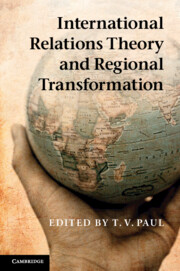Book contents
12 - Strategies and mechanisms of regional change
Published online by Cambridge University Press: 05 June 2012
Summary
The goal of this volume is to broaden the scholarship on regions and regional change. We seek to move away from the “war of paradigms,” to address regional transformation through an intra- and inter-paradigmatic exchange. Each International Relations (IR) theoretical paradigm, whether from the realist, liberal, or constructivist tradition, can only partially account for patterns of regional conflict and cooperation. A natural division of labor has emerged in the study of regional security, where realists tend to focus on the likelihood of war and stability, liberals on the conditions leading to peace, and constructivists on the foundations of long-lasting or deep peace and the emergence of pluralistic security communities. Together, these theoretical traditions unevenly cover the broad empirical spectrum of regional transformation. Instead of opting for a division-of-labor approach, based on each theory’s comparative advantage, the contributors to this volume were tasked with answering a common set of questions and encouraged to relax their theoretical assumptions so as to offer middle-range eclectic approaches. The objective was to bring the authors outside of their comfort zone and engage each other in an effort to provide a richer analysis of regional change.
The research questions that focused the analyses were stated in the introduction in general terms. What are the prerequisites for a stable regional order? How can we make sense of transitions from war to peace, peace to war, or from peace to enduring peace? IR theories propose different causal mechanisms to explain change in the international system, but can these theories be adapted to make sense of regional-level change? The authors in this volume think so. This chapter is organized in four sections: the first section presents the concepts that are central to the book; the second discusses new theoretical guidelines to study regional order; the third provides an overview of the main arguments advanced in this book; while the final section discusses a research agenda for greater understanding of regional order and peace.
- Type
- Chapter
- Information
- International Relations Theory and Regional Transformation , pp. 283 - 298Publisher: Cambridge University PressPrint publication year: 2012
References
- 1
- Cited by



